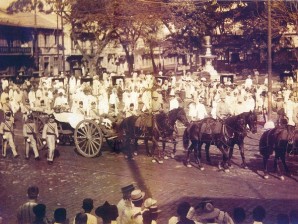Rizal’s martyrdom remembered

The President said the double celebration challenged Filipinos “to forge unity in the face of differences.”
As “Bayan Ko” played, the President, Dr. Maria Serena Diokno of the National Historical Commission of the Philippines, and Armed Forces Chief General Jessie Dellosa walked from a platform to the monument, as two ceremonial elements in gray uniform carried the wreath.
Standing before the monument, Aquino gave a salute as a cackle of gunfire filled the air. Rizal’s descendants, Amelia Garcia Yulo, Victor Reyes, Malou Villaroman, Marlene Jacinto and Gemma Cruz-Araneta, among others, stood close by.
Shortly after, a funeral dirge was played.
Minutes earlier at around 7 a.m., as a large crowd gathered around Rizal Park, the President hoisted the flag on the Independence flagpole in front of Rizal’s monument, which was simultaneously held in Rizal shrines across the country.
Article continues after this advertisementJoining him were Vice President Jejomar Binay Jr., Defense Secretary Voltaire Gazmin, Foreign Secretary Albert del Rosario, Diokno, Dellosa, Manila Mayor Alfredo Lim, Reghis Romero II, supreme commander of the Order of the Knights of Rizal; and Santiago Gabionza Jr., grandmaster of the Grand Lodge of Free and Accepted Masons of the Philippines.
Article continues after this advertisementSunday’s commemoration of Rizal Day was doubly significant because it coincided with the 100th anniversary of the transfer of Rizal’s remains from his sister’s home in Binondo to the Luneta Park, where they were interred at the base of the monument on December 30, 1912.
“This year, we’re marking the 100th year of the interment of our national hero’s remains at the Rizal Park where Filipinos can freely honor his important contribution to the shaping of our country,” the President said in a statement posted on the government website.
“For his memory’s sake, we continue to respond to the challenge of the times: how to weave unity in spite of differences? How to inflame concern for others and flag? We hope that we will be more determined in paddling toward the same direction to achieve the full potential of our National Language,” he added.
Before dawn Sunday, in a reenactment of the funeral march from Narcisa’s house, an urn containing a piece of a bone from Rizal’s spine was transported on a motorized caisson and escorted by the Knights of Rizal from Binondo to Luneta.
The bone was part of Rizal’s spinal column which was shattered by a bullet during his execution on December 30, 1896.
After his execution, Rizal’s remains were clandestinely interred in Paco Park. After exhumation in 1898, these were kept by the Rizal family until December 30, 1912, when these were interred in the foundations of the monument.
“Rizal‘s devotion to truth, justice, and the civic virtues impelled him to deplore and expose the abuses of colonialism, resulting in his incarceration and eventual execution. It was through the gift of language and the written word that our national identity was formed: as the late Leon Ma. Guerrero described him, he was, indeed, the First Filipino,” Secretary Edwin Lacierda, presidential spokesperson, said in a statement.